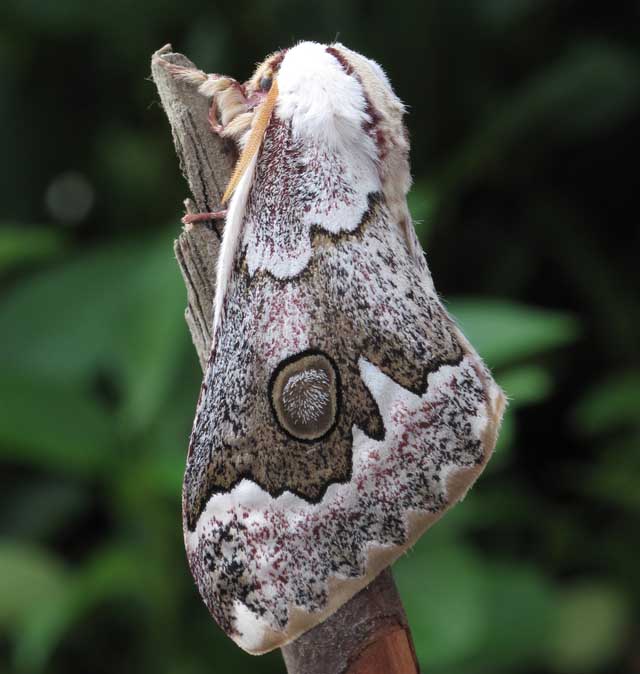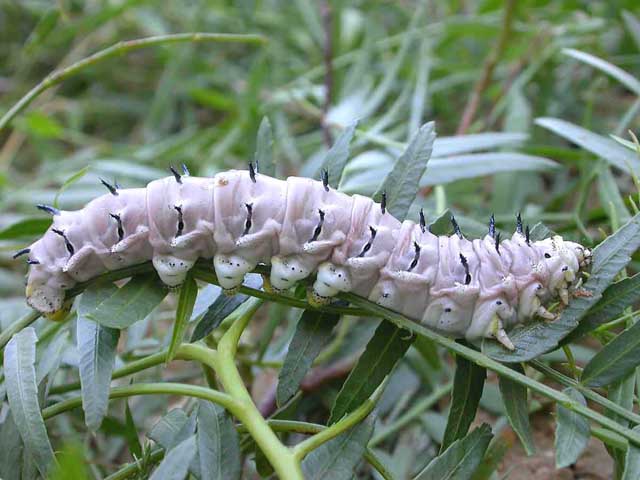USTA OF THE WORLD

Usta angulata male, courtesy of Gary Saunders.
|
|
Updated as per Pinhey's Emperor Moths of South and South-Central Africa, 1972, April 25, 2006 Updated as per Bouyer's Catalogue of African Saturniidae, 1999, April 25, 2006 Updated as per Oberprieler's The Emperor Moths of Namibia, April 25, 2006 Updated as per Cooper & Cooper's The Emperor Moths of KwaZulu-Natal, April 25, 2006 Updated as per personal conversation with Thierry Bouyer, May 2006 Updated as per wiki/Usta; (alba); December 23, 2013 |

These moths have an off-white ground colour with brown speckling. The moderate to large-sized, brown-centered eyespots are ringed with yellow and black.
Small eggs are deposited in groups of 10-20 on a hostplant leaves.
Initially larvae skeletonize leaves by eating holes in softer tissue from bottom up. As larvae develop, feeding is from the outside edge of the leaves.
At pupation time, larvae descend tree trunks to pupate in underground chambers.

Usta angulata larva, courtesy of Rodolphe Rougerie.
U. angulata has the forewing outer line sinuous and irregulary toothed. U. wallengrenii has the forewing outer line evenly curved (convex) and evenly toothed. The various U. terpsichore suspecies have a sinuous outer line that is only slightly toothed and relatively evenly curved (convex) just for the upper half.
The Usta belong to the tribe Urotini, Subfamily Saturniinae, Family Saturniidae; these moths all fly in Africa
P indicates an image is available.
N alba Terral & Lequeux, 1991
Tanzania; elevated to full species status
P angulata Rothschild,1895
Kenya,
Tanzania
P terpsichore
(Maassen & Weyding, 1885) southern:
South Africa,
Namibia,
Botswana,
Zimbabwe (RO),
Zambia,
Mozambique,
Malawi,
Tanzania, to
Democratic Republic of the Congo to northeastern Africa:
Kenya and
Ethiopia;
west to Burkina Faso (RR); probably in
Central African Republic,
Cameroon,
Gabon and
PR Congo and
Nigeria as various subspecies or forms
P terpsichore subangulata Bouvier, 1930
Malawi,
Democratic Republic of the Congo
P terpsichore grantae Terral & Lequeux, 1991
Tanzania
P terpsichore abyssinica (Aurivillius, 1898) Abessinien (high country in
Ethiopia
N terpsichore yaere Darge, 1994 possibly?? northern plains of
Cameroon,
southernwestern
Chad, northeastern
Nigeria
P wallengrenii (Felder, 1859)
Namibia and
Angola
biplaga, Rebel, 1912, is the same as wallengrenii according to Thierry Bouyer.
Use your browser "Back" button to return to the previous page.